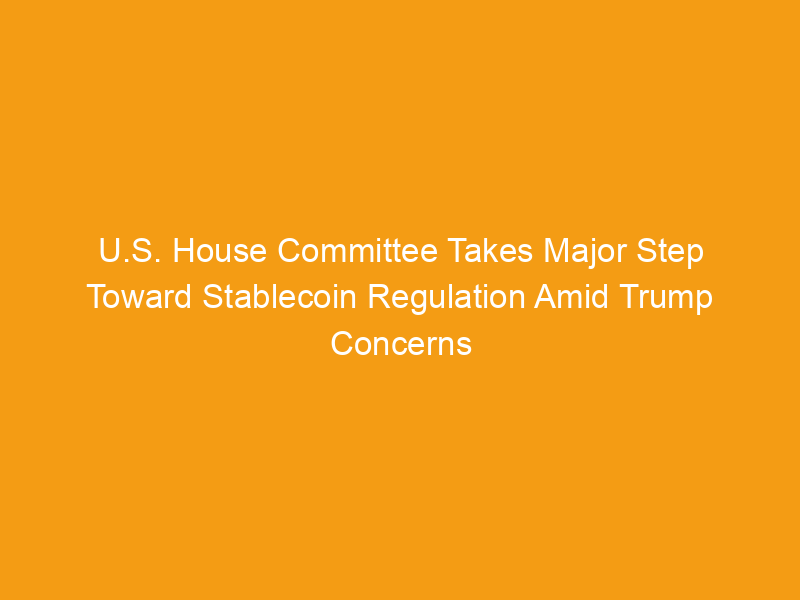Advancing Legislation for U.S. Stablecoins
On Wednesday, a significant milestone in U.S. stablecoin legislation was achieved as a committee of the House of Representatives advanced a pivotal bill, aligning closely with similar efforts in the Senate. This progression brings the regulation of stablecoins nearer to implementation and sets the stage for comprehensive legislative action.
With aspirations for completion by August, Republican lawmakers and former President Donald Trump are pushing for swift approvals from both the House and Senate. The ultimate goal is to reconcile the differing versions of the bill into a cohesive framework that can receive final approval.
Bipartisan Support with Democratic Reservations
The Stablecoin Transparency and Accountability for a Better Ledger Economy (STABLE Act) received a warm welcome from a mix of Republicans and supportive Democrats during its advancement out of the House Financial Services Committee. However, the Democratic members expressed ongoing concerns regarding Trump’s ties to the cryptocurrency sector and the implications for stablecoin regulations. Despite these objections, five Democrats joined 27 Republicans to push the bill forward after an extensive markup session.
In the week leading up to the committee meeting, World Liberty Financial (WLFI), a company linked to Trump, announced its intention to launch its own stablecoin, USD1. Trump’s active participation in the crypto space includes selling non-fungible tokens (NFTs) and promoting the memecoin $TRUMP, all while advocating for favorable federal policies regarding cryptocurrencies.
The Need for Regulatory Frameworks
The regulation of stablecoins, which are typically pegged to the U.S. dollar—such as Tether’s USDT and Circle’s USDC—represents a top priority for the cryptocurrency industry. Committee Chairman French Hill emphasized the importance of establishing “guardrails” for innovation rather than imposing unnecessary barriers.
While Republican committee members refrained from directly addressing Trump’s involvement in the crypto industry, Democrats proposed amendments aimed at mitigating potential conflicts of interest stemming from the former president’s business ties. These amendments were ultimately rejected by the Republican majority, who dismissed them as “unnecessary.”
Concerns Over Conflicts of Interest
Representative Maxine Waters, the senior Democrat on the panel, accused Trump of leveraging his presidential influence to promote various crypto ventures for personal gain, labeling his actions as “a display of greed.” Fellow Democrat Representative Stephen Lynch stressed the unique position Trump occupies as the former president, arguing that his ability to influence government assistance for his business interests raises significant ethical concerns.
Moreover, Illinois Representative Sean Casten pointed out that substantial investments from foreign entities, such as Justin Sun’s financial backing of WLFI, could lead to hidden influences on government officials involved in stablecoin regulation.
No Amendments Passed
Despite the Democrats’ arguments, the Republican majority on the committee remained unmoved, resulting in no new amendments being incorporated into the bill. Supporters noted that the House version aligns closely with the Senate’s proposal. Michigan Republican Representative Bill Huizenga expressed confidence that the bill effectively empowers state regulators while maintaining a balanced approach to oversight.
A Broader Crypto Legislative Landscape
The stablecoin bill was one of several pieces of legislation considered by the House Financial Services Committee, including measures aimed at establishing an inter-agency task force to combat illicit cryptocurrency activities and a bill opposing U.S.-issued central bank digital currencies (CBDCs). During the markup session, lawmakers engaged in extensive voting, which led Rep. Lynch to humorously remark on the potential record for the most failed votes in succession.
The Financial Technology Protection Act, addressing the need for coordinated law enforcement against illegal crypto usage, passed unanimously with a vote of 49-0. The anti-CBDC bill also garnered significant support, passing with 27 votes while 22 lawmakers opposed it.
Looking Ahead
Despite initial technical difficulties with the electronic voting system, the committee successfully completed voting on all five proposed bills by 11:15 p.m. ET, nearly 12.5 hours after the markup began. As the stablecoin bill progresses, Trump is also expected to sign a resolution that nullifies an Internal Revenue Service rule targeting decentralized finance (DeFi) operations, marking a significant pro-crypto action by Congress. While the precise timing of the signing remains unclear, the anticipation continues to build around future developments in the cryptocurrency regulatory landscape.



